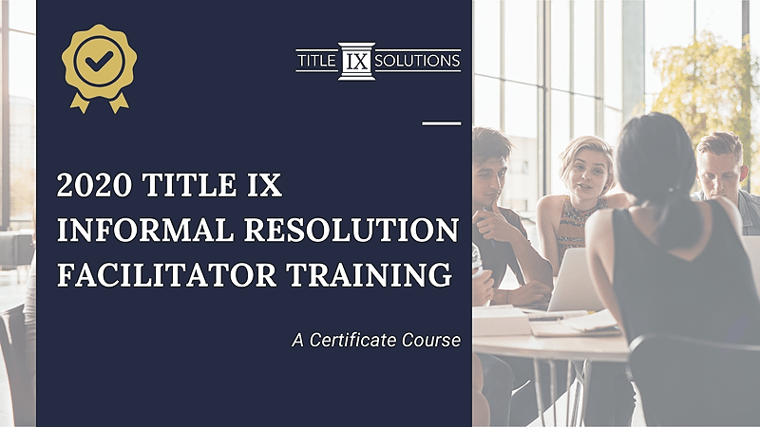As part of our four-part Free Summer Webinar Series, Title IX Solutions recently hosted an “Informal Resolution” webinar with Title IX experts C.J. Larkin and Jim Reeves. The following article is a recap of what they covered in the webinar. To stay informed of future free webinars, please sign up for the Title IX News & Insights newsletter.
What is Informal Resolution?
Title IX Informal Resolution (IR) is a process designed to address complaints less formally than a traditional hearing. IR provides an alternative to formal resolution processes, such as hearings. It emphasizes:
- Restorative Justice: Focuses on understanding the harm caused and how to repair it.
- Education: Helps students learn about the consequences of their decisions.
- Flexibility: Allows for a more adaptable process compared to structured hearings.
- Voluntary Participation: All parties must agree to participate.
Informal Resolution, which is rooted in restorative justice principles, offers an educational opportunity for students to understand the impact of their actions and work towards repairing any harm caused. It also allows the parties an opportunity to maintain some control over the outcome of the matter.
The Informal Resolution Process
- Initial Screening: The Title IX Coordinator reviews the complaint and any available information to determine if the case is suitable for IR. Safety, both emotional and physical, is a primary consideration.
- Facilitator and Advisor Selection: A trained facilitator, neutral to all parties, is chosen to guide the IR process. Parties also have the option to be accompanied by advisors (friends, family, faculty, or attorneys) for support.
- Pre-Informal Resolution Meetings: The facilitator meets separately with each party and their advisors to explain the IR process, its goals, and ground rules. The facilitator also assesses the suitability of the case for IR.
- Agreement to Participate: Parties sign an agreement indicating their voluntary participation in the IR process.
- Informal Resolution Meeting: Parties have the opportunity to discuss with the facilitator and/or the other party the incident, its impact, and sometimes numerous options and conditions for potential resolutions. This meeting can be structured in various ways, including using tools like breakout rooms in virtual settings, to ensure comfort and safety.
- Agreement Drafting and Implementation: The IR Facilitator creates a written agreement, based on significant input from the parties, outlining the agreed upon resolution. The Title IX Coordinator reviews the agreement to ensure it is practical and enforceable.
- Monitoring and Enforcement: The Title IX Coordinator is responsible for monitoring and enforcing the written agreement.
The Role of the Title IX Coordinator
The Title IX Coordinator plays a crucial role throughout the IR process, including:
- Initial Screening: Determining if a case is appropriate for IR.
- Facilitator Selection: Identifying and assigning a qualified facilitator.
- Agreement Review: Ensuring the written agreement is sound and implementable.
- Monitoring and Enforcement: Overseeing adherence to the agreement and addressing any violations.
Key Considerations for Facilitators
Facilitators ensure a fair and productive IR process by:
- Maintaining Neutrality: Remaining impartial and without personal or professional interest in the case.
- Ensuring Confidentiality: Keeping discussions within the IR meeting private.
- Guiding the Process: Helping parties understand the goals of IR and facilitating constructive dialogue.
- Assessing Participant Readiness: Evaluating the willingness and ability of parties to engage in a restorative process.
Pre-Informal Resolution Meeting Checklist
Facilitators typically cover these points in pre-IR meetings:
- Introduction of the facilitator and their role.
- Explanation of the confidential nature of IR.
- Clarification of the facilitator’s neutral position.
- Discussion of the purpose and ground rules of the IR meeting.
- Opportunity for parties to ask questions and express concerns.
- Signing of the agreement to participate (or providing time for review).
Assessment Questions for Parties
To prepare parties for the joint meeting, facilitators may ask:
- What would you like to say to the other party?
- What questions do you have for the other party?
- What questions do you anticipate the other party might ask?
Want to Go Deeper?
This overview just scratches the surface. For those looking to build confidence and capacity around Informal Resolution, explore the following resources:
- Watch the full webinar on-demand – Hear directly from C.J. Larkin and Jim Reeves as they break down real-world applications and answer key questions.
- Need support? – Title IX Solutions offers outsourced Informal Resolution services led by experienced, neutral facilitators.
- Build your expertise – Enroll in our Informal Resolution Certificate Course at the IX Institute to gain practical tools and earn a credential in this growing area of practice.
Please Note: The information provided in this article is for educational purposes only and is not intended to be legal advice. We recommend seeking independent legal advice concerning the issues presented in evaluating a particular incident.
Looking for Title IX Informal Resolution Training? Check Out Our On-Demand Course:
Gain expertise in guiding Title IX informal resolution processes with neutrality, professionalism, and compliance to ensure fair, effective, and voluntary outcomes.



